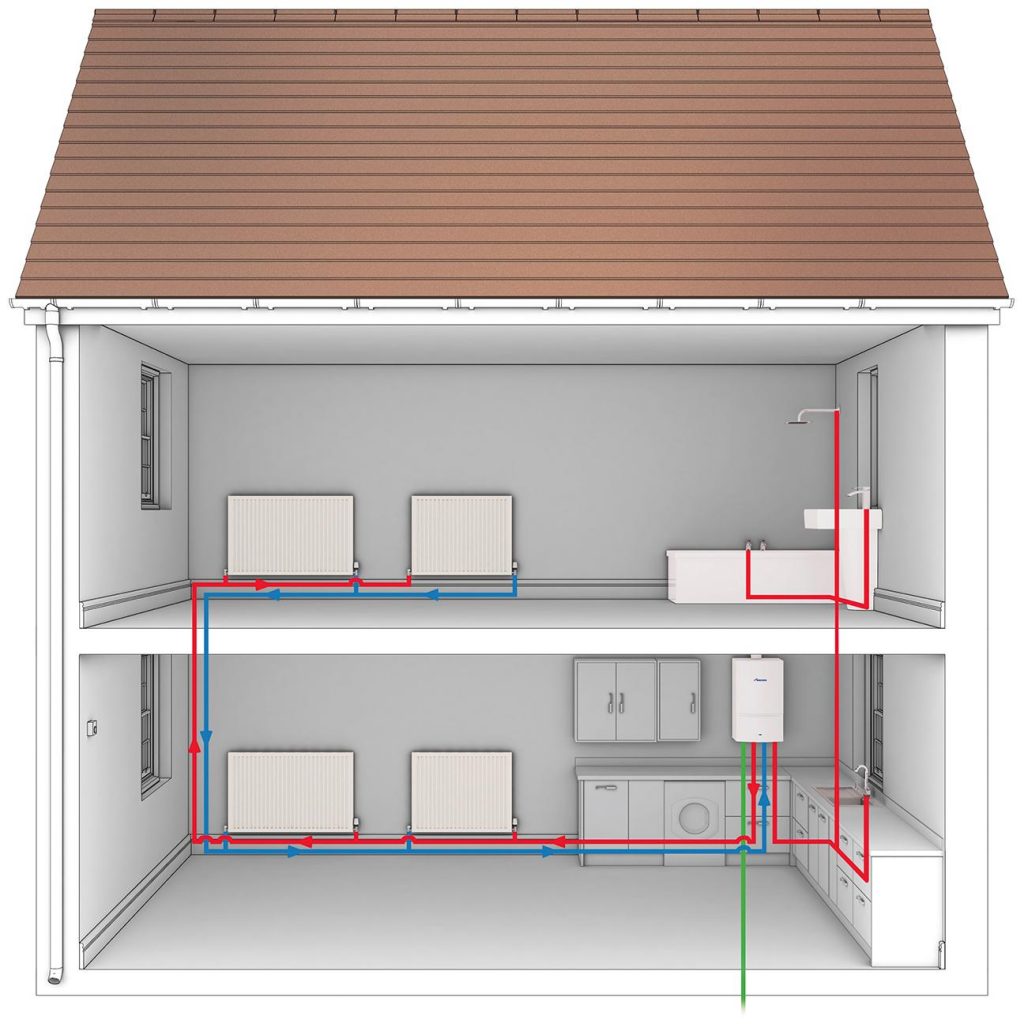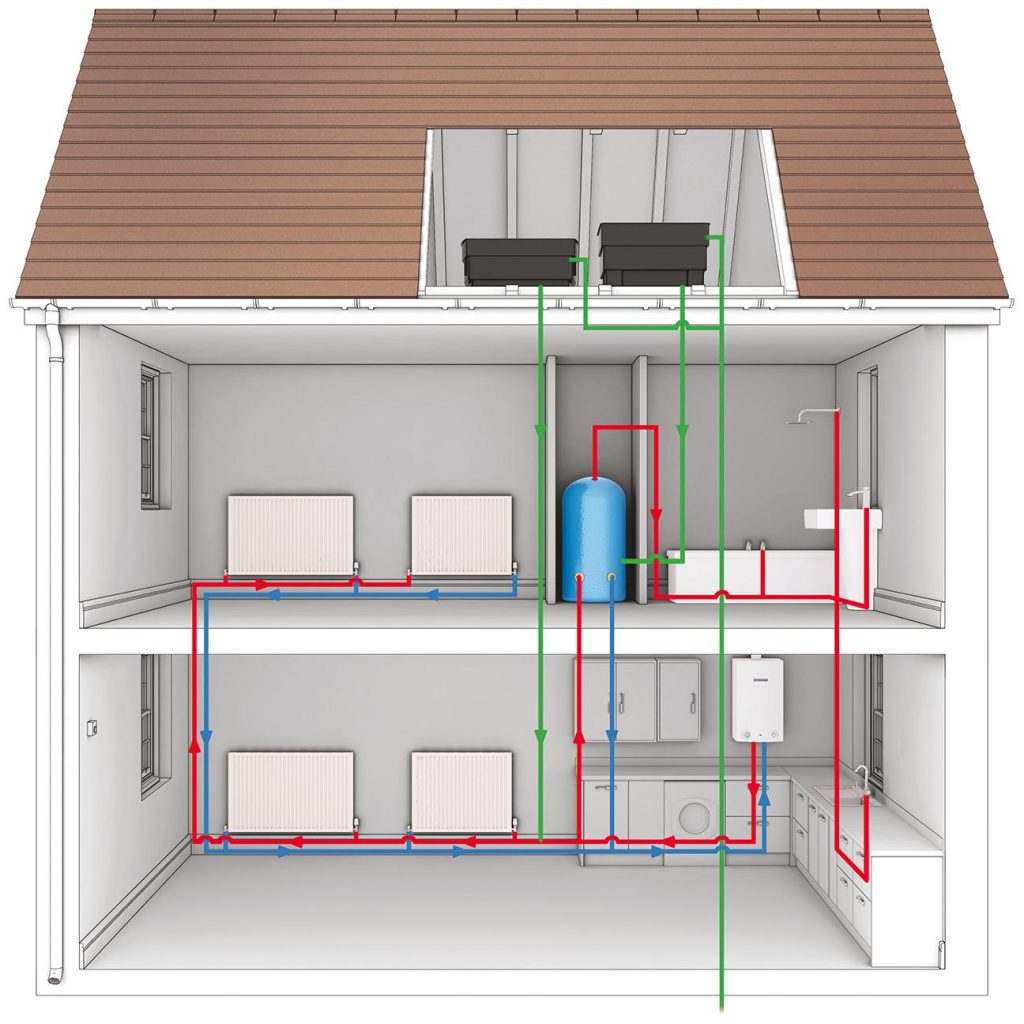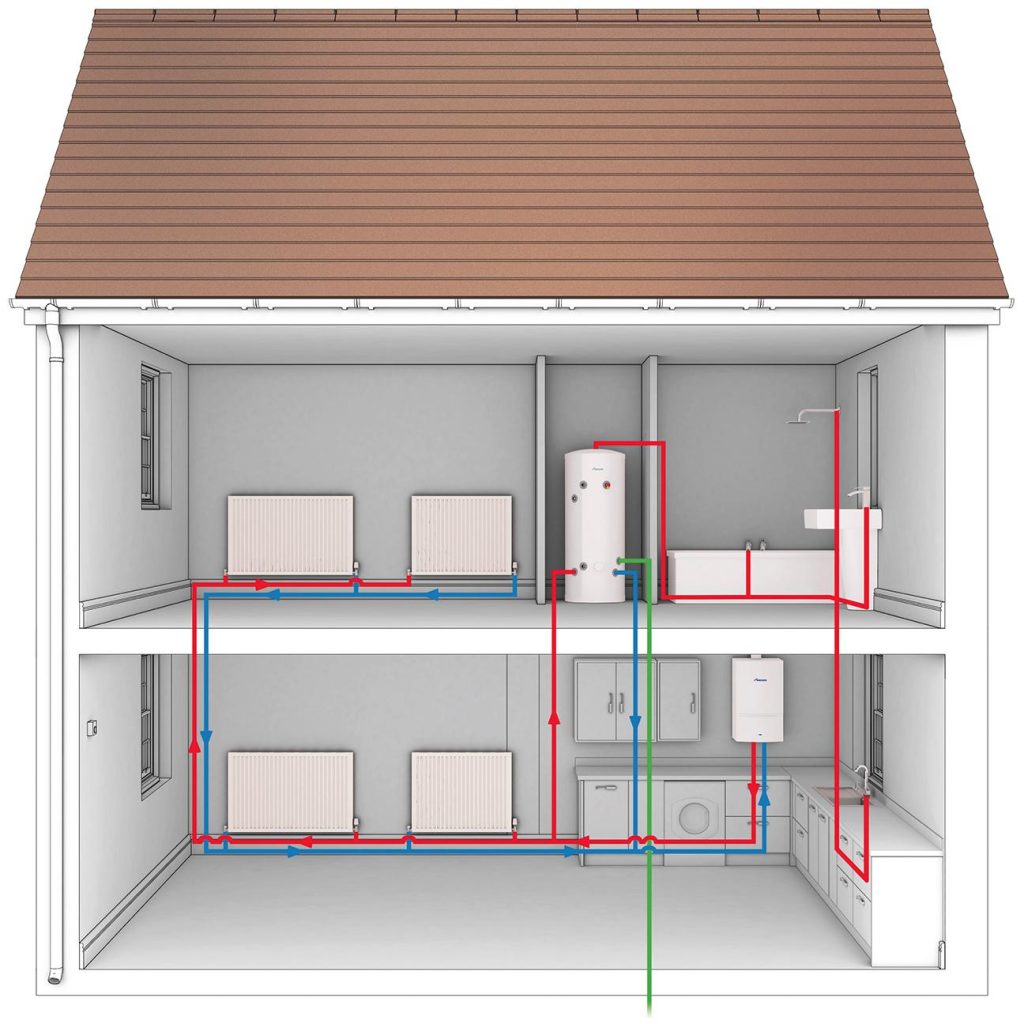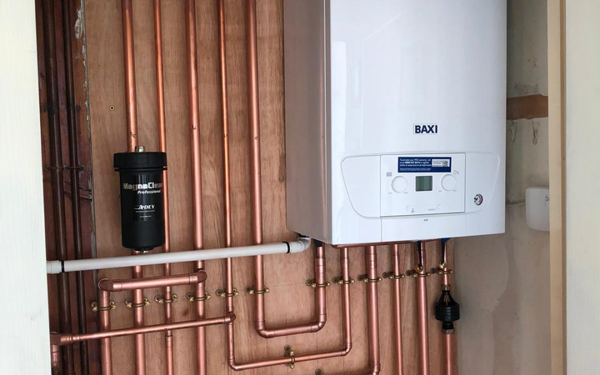Before the invention of the modern boiler, people relied on wood and coal fires in order to supply them with hot water and heat their homes. This was a lot of work. It meant lighting, tending to and cleaning a fire in every room that you wanted to be comfortable in.
Today this would be an unthinkable inconvenience for most people. Fortunately we now have boilers to do the hard work for us. There are three main types of boilers. These are:
- Combi boilers
- Conventional boilers
- System boilers
If your boiler is showing signs that it might be giving up, then it’s time to consider your next one. Here we will tell you everything you need to know about each of these boiler types. We will also tell you the pros and cons of each of them.
Combi Boilers
A combination boiler (more often known as a combi boiler) is the most common type of boiler system used in the UK. A combi boiler is capable of providing hot water on demand. It is therefore a great choice for the majority of households. However, a combi boiler isn’t suitable for everyone.

Combi Boiler Advantages
- Allows hot water to be heated on demand
- Eliminates the need for a cold water feed and expansion tank in the loft.
- More compact, so it takes up less space and looks neater
A combi boiler will allow the hot water within your home to be heated on demand. So you can get hot water as and when you need it. This means that water isn’t heated unnecessarily, and therefore could help to reduce your energy costs. A combi boiler heats the water as it enters your property via the mains.
This means that there is no need for a bulky expansion tank in your loft. In fact, a combi boiler is all you need to be able to get hot water for your household. As a result, much less space is wasted overall. Not only that, but the entire hot water system within your home will look neater and more compact. This is why combi boilers are so popular with newbuild properties, where space is often at a premium.
Combi Boiler Disadvantages
- Contain more moving parts than conventional boilers
- Not as useful for larger households
The main problem with combi boilers however, is the complexity of them.
A combi boiler contains many moving parts when compared to a conventional boiler. As with all complexed machinery, this means that there is a larger scope for things to go wrong . If your boiler breaks down, then it means that you have no access to hot water. Hot water is important for sanitation as well as heating your home.
Combi boilers are only really useful for smaller households, where there will be less demand for hot water. The hot water from a combi boiler system can only be used for one task at a time.
This can be an issue in larger households. For example, if one person wishes to have a shower while someone else is running the hot tap downstairs at the same time.
Conventional Boilers
Heat-only boilers (also referred to as conventional boilers) contain components that are housed outside of the boiler itself. Such components can be a circulation pump or water tank. Typically a heat-only boiler system will also require cold water.
With conventional boiler system, the hot water is stored in a hot water cylinder or storage tank. This is often housed within the airing cupboard. Such systems will often have an on and off switch. This allows you to heat the water stored in the cylinder when you are going to need it. You can then leave it switched off when not in use to save energy costs.

Conventional Boiler Advantages
- Much more suited to larger households than combi boilers
In larger households, it’s more likely that several people are going to want to use hot water at the same time. A conventional boiler is useful here. It means that the hot water stored in the cylinder can be delivered to whoever needs it.
Conventional Boiler Disadvantages
- Unlike a combi boiler, hot water isn’t available on demand
- Slightly less efficient than combi boilers
A conventional boiler uses water that is stored in a tank, so you will need to wait until this water is heated up before you get hot water. This isn’t usually much of an issue in itself. The tanks are well-insulated to keep the water hot for long periods of time.
A problem can occur when the water from the tank is used up. For example, after someone has run a bath. Once the hot water in the cylinder is gone, you will need to wait for more water to be heated.
Over time, the water stored in the hot water cylinder will lose heat. This means that more energy will need to be used in order to heat it up again. This isn’t a huge problem, but it makes conventional boilers systems less efficient than combi boiler systems.
System Boilers
If you’re considering getting a conventional boiler system, but don’t want all of the external components that come with it, then a system boiler could be the type of boiler for you.
A system boiler still requires the external components. However they are built into the main body of the boiler in order to save space.
A system boiler still needs a hot water cylinder to store hot water. The feed and expansion tank (which can usually be found in the loft) is replaced by an expansion vessel in the boiler itself. This vessel will also typically contain the circulation pump as well as some of the valves.

System Boiler Advantages
- Great for larger homes
- Do not require the space for a cold water tank
- Great for areas with low mains-pressured water
System Boiler Disadvantages
If you live in a large house or a household with lots of people, then a system boiler will be useful as it will allow hot water to be drawn from more than one tap at a time. This means that it’s possible to have a shower in one room, while someone else is using hot water in another.
And, unlike conventional boiler systems you won’t need a large cold water tank in the loft of your home, which will of course save space. If you live in an area where the water pressure from the mains is low, then a system boiler will be an excellent choice.
- Space is still needed for a hot water cylinder
- More expensive to install than combi boilers
- Not as efficient as combi boilers
- Hot water is limited
Many of the disadvantages of system boilers are the same as those of conventional boilers. Although for a system boiler you won’t need space in the loft for a cold water tank, you will still need to house a cylinder for hot water. This can usually be found in an airing cupboard. There are more components to a system boiler than a combi boiler, so it will likely cost more than a combi boiler to have installed.
You will also have the same efficiency issues with a system boiler as you would with a conventional boiler.
The water stored in the hot water tank will cool over a period of time, and therefore energy will be used to keep it hot. And, just like with a conventional boiler, a system boiler will only supply a limited amount of hot water (dependent on the size of your hot water cylinder), before you need to wait for more water to be heated again.
Which Type of Boiler Should I Choose?
All three types of boilers come with advantages and disadvantages of their own. In a nutshell, if you live in a small house and have a small household, then a combi boiler will probably be more than suitable. Not only are combi boilers more energy efficient than conventional or system boilers, but they also require less space to install. The disadvantage of taking up less space, is that there are more components within the boiler housing unit itself, which increases the chances of something going wrong and a potentially costly repair.
If you live as part of a larger household, but space is still an issue, then a system boiler could be the perfect compromise. System boilers can cope with more hot water demand than combi boilers, and they don’t require a large cold water tank in the loft. The disadvantage of this type of system is that the hot water available is limited to the capacity of the hot water storage tank, and it is not as energy efficient as a combi boiler. It would also cost more money to have a system boiler installed due to the fact that it contains more components overall.
If you live in a larger household and space is not an issue, then a conventional boiler system would be the ideal solution. This would mean that you’d have sufficient hot water for all of your household’s needs. The boiler itself would be cheaper than a system boiler, but you would still have the slight issue of it being less efficient than a combi boiler.
Whatever type of boiler you choose, make sure to protect your investment by taking out boiler cover. At CompareBoilerCover you can see quotes at a glance and choose the right boiler cover to suit your needs.
Frequently Asked Questions
Not only is a combi boiler more energy efficient than a conventional or system boiler, but it also has less external components. This means that the central heating and hot water systems take up less space, and it looks a lot neater overall.
A combi boiler is a very efficient way of getting hot water. However, it is unable to cope with high demand. Therefore if you live in a large household where hot water would often be needed in several places at once, it’s best to have either a conventional or system boiler in place.
It’s true that conventional boilers aren’t as energy-efficient as combi boilers. However, they are not necessarily uneconomical. The main energyh loss with a conventional boiler system comes from the fact that heated water is stored in a tank, which will therefore gradually lose heat over the course of time.

6 replies on “Three Main Boiler Types in the UK”
[…] are memory foam on one layer, but also with pocket springs on another layer, i.e. a combination. A bit like a combi-boiler but for […]
Do houses with combi boilers not have airing cupboards then?!
Thank you for clarifications Ms Queenie My Dearest. Here we have a boiler, my family not sure on the type, and your clarirfications given us hope. Take car my sweet and have a blessed day further ^^
[…] for less than £2,000 – and that usually includes a 10 year warranty. Once you’ve figured out what type of boiler you need, it’s just a case of shopping around for the best […]
[…] you do not have a combi boiler, then the chances are you’ll have a hot water cylinder somewhere in your house. This will have […]
how do i email you guys?